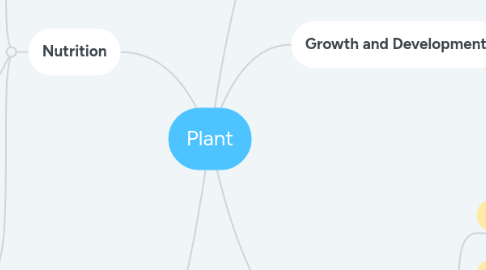
1. Plant Maintenance
1.1. Osmosis
1.1.1. movement of water from an area of lower solute concentration to an area of higher solute concentration
1.2. Tonicity
1.2.1. ability of an extracellular solution to make water move into or out of a cell by osmosis
2. Nutrition
2.1. Essential Nutrients
2.1.1. Nitrogen
2.1.1.1. is a major component of proteins, hormones, chlorophyll, vitamins and enzymes essential for plant life
2.1.2. Potassium
2.1.2.1. is necessary for formation of sugars, starches, carbohydrates, protein synthesis and cell division in roots and other parts of the plant
2.1.3. Phosphorus
2.1.3.1. is necessary for seed germination, photosynthesis, protein formation and almost all aspects of growth and metabolism in plants
2.2. Macronutrients
2.2.1. Calcium
2.2.1.1. activates enzymes, is a structural component of cell walls, influences water movement in cells and is necessary for cell growth and division
2.2.2. Magnesium
2.2.2.1. is a critical structural component of the chlorophyll molecule and is necessary for functioning of plant enzymes to produce carbohydrates, sugars and fats
2.2.3. Sulfur
2.2.3.1. is a structural component of amino acids, proteins, vitamins and enzymes and is essential to produce chlorophyll
2.3. Micronutrients
2.3.1. Iron
2.3.1.1. is necessary for many enzyme functions and as a catalyst for the synthesis of chlorophyll
2.3.2. Manganese
2.3.2.1. is involved in enzyme activity for photosynthesis, respiration, and nitrogen metabolism
2.3.3. Copper
2.3.3.1. is concentrated in roots of plants and plays a part in nitrogen metabolism. It is a component of several enzymes
3. Hormones
3.1. Auxins
3.1.1. a plant hormone that causes the elongation of cells in shoots and is involved in regulating plant growth
3.2. Gibberellins
3.2.1. any of a group of plant hormones that stimulate stem elongation, germination, and flowering
3.3. Cytokinins
3.3.1. is a type of plant hormone that primarily stimulates cell division and are a derivative of the purine adenine
3.4. Abscisic Acid
3.4.1. functions in many plant developmental processes, including bud dormancy, and can be involved in stress responses
3.5. Ethylene
3.5.1. it prevents cells from elongating and promotes leaf Abscission, while sometimes being responsible for the ripening of fruit
4. Growth and Development
4.1. Development
4.1.1. Growth
4.1.1.1. cell enlargement
4.1.1.1.1. Without cell enlargement, no organism can continue to grow. Cells unable to enlarge eventually are unable to divide such that growth will cease.
4.1.1.2. cell division
4.1.1.2.1. the number of cells increases due to mitosis
4.1.1.3. diffirentiation
4.1.1.3.1. refers to the processes by which distinct cell types arise from precursor cells and become different from each other
5. Plant Transport
5.1. Xylem
5.1.1. involved in the movement of water through a plant from its roots to its leaves
5.2. Phloem
5.2.1. involved in the movement of water through a plant from its roots to its leaves
5.2.2. carries sugar & other organic nutrients made by plant from the leaves to the rest of the plant

